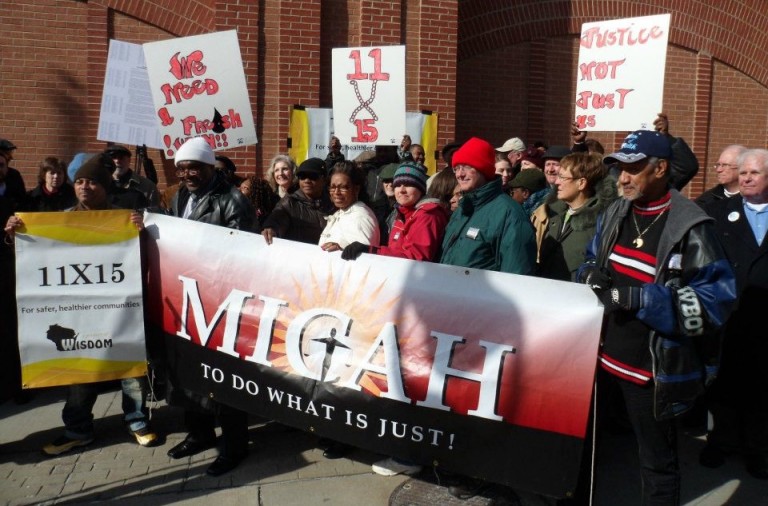How to Combat Mass Incarceration
Federal bill would reform system. Sen. Baldwin supports it. Will Sen. Johnson?

Demonstrators march in front of the Milwaukee Secure Detention Facility, 1015 N. 10th St., during an event to launch WISDOM’s campaign to end mass incarceration in Wisconsin. Photo by Barbara Pfarr.
The Sentencing Reform and Corrections Act would be an important first step in reforming our unjust federal punishment system. However, numerous politicians, including Milwaukee County Sheriff David Clarke, still oppose this bill that would reduce several mandatory minimum sentences, reduce racial disparities in incarceration and expand rehabilitation programs for currently incarcerated people.
Wisconsin’s senators have not signed on as co-sponsors of the Sentencing Reform and Corrections Act yet. Sen. Tammy Baldwin supports the bill, but she is waiting for another Republican to sign on before she co-sponsors it. Sen. Ron Johnson has not yet taken a position on this proposal.
The U.S. Congressional Budget Office estimates that this bill would save taxpayers more than $700 million over the next 10 years. The federal government could instead spend this money on strengthening neighborhoods in Milwaukee and throughout the country that have been disproportionately impacted by mass imprisonment.
Federal legislators are making little progress on justice system reform, but they are doing better than policymakers in Wisconsin. In June 2015, Gov. Scott Walker said that the “challenges in terms of people being incarcerated for relatively low offenses is not a significant issue in the state of Wisconsin.” Actually, it is a huge problem.
The first step to solving a problem is admitting you have one. It is time for Clarke, Johnson and Walker to acknowledge that mass incarceration has devastated neighborhoods here in Milwaukee and across the country. Walker must face the fact that crimeless revocation (the practice of re-incarcerating individuals on probation, parole, or extended supervision for minor rule violations) is more than significant. It is a failed policy, a waste of money and an embarrassment to Wisconsin.
Several states have shown that they can decrease levels of incarceration without compromising public safety. Two studies demonstrate that recent policy changes that resulted in the release of nearly 30,000 people from prisons in California did not cause increases in crime. Policy reforms there included greatly reducing the use of incarceration for crimeless revocations and enabling some people with convictions for violent crimes to be eligible for parole. Thirty states cut both rates of imprisonment and crime from 2008 to 2013.
My own story provides an example of why legislators should enact sentencing reform and revocation policy reform. When I was 19 years old, I faced over 100 years in prison for non-violent offenses, but Wisconsin officials released me after I served 20 months of a 30-month sentence. Fortunately for me, Wisconsin did not have any long mandatory minimum sentences for these offenses at the time.
The Department of Corrections also forced me to spend six months in the Milwaukee Secure Detention Facility for allegedly violating a rule of community supervision that did not involve a new crime — a crimeless revocation. We are talking about imprisoning people for minor infractions like unauthorized computer or cell phone use, crossing county lines, missing appointments, failing alcohol tests and entering bars.
Incarcerating people for technical violations destroys lives, contributes to overcrowding in jails and adds nothing to public safety. It is also fiscally irresponsible.
Crimeless revocation plays a central role in maintaining mass incarceration in Wisconsin and explaining why Wisconsin imprisons black men at a higher rate than any other state. Crimeless revocations accounted for about half of all new admissions to Wisconsin prisons since 2000.
I completely turned my life around over the last 16 years. During this time period, I earned two master’s degrees and worked for several nonprofit organizations. I am the associate organizer of EXPO, a Ph.D. candidate at the University of Wisconsin-Milwaukee, the chair of WISDOM’s post-release issues workgroup, and a board member of Project RETURN, a nonprofit organization in Milwaukee that helps men and women leaving prison make a positive and permanent return to our community. I could not have accomplished all of this if a judge had been forced to sentence me to a minimum of 20 years in prison.
I am just one of many EXPO leaders who have succeeded after being released from prison. Wisconsin taxpayers regularly pay more than $150 million each year to unnecessarily imprison individuals for crimeless revocations. This money should instead be used to build human potential.
In response to concerns raised by EXPO and WISDOM, a group of state representatives led by Mandela Barnes, David Bowen, Evan Goyke and LaTonya Johnson introduced a bill in 2015 that would have limited the number of people who could be sent back to prison for technical violations. Unfortunately, legislators did not enact this bill.
Lawmakers at the national level and in Wisconsin should not wait any longer to reform sentencing and revocation policies that contribute to mass incarceration.
Mark Rice, president of EX-Prisoners Organizing.
This story was originally published by Milwaukee Neighborhood News Service, where you can find other stories reporting on fifteen city neighborhoods in Milwaukee.
Op-Ed
-
Wisconsin Candidates Decry Money in Politics, Plan to Raise Tons of It
 Dec 15th, 2025 by Ruth Conniff
Dec 15th, 2025 by Ruth Conniff
-
Trump Left Contraceptives to Rot; Women Pay the Price
 Dec 8th, 2025 by Dr. Shefaali Sharma
Dec 8th, 2025 by Dr. Shefaali Sharma
-
Why the Common Council’s Amended Budget is Good Policy for Milwaukee
 Nov 20th, 2025 by Alds. Marina Dimitrijevic and Russell W. Stamper, II
Nov 20th, 2025 by Alds. Marina Dimitrijevic and Russell W. Stamper, II






















As a Probation and Parole Agent for years before I was promoted to and worked as a supervisor of agents for 16 years until I retired, I expected my agents to try to gain the cooperation of offenders they supervised by trying to convince offenders exactly how they will benefit by doing what the agent requests or requires them to do.
I expected my agents to try to use this approach to gain cooperation when likewise explaining how it benefits offenders to maintain sobriety or not use illegal drugs, or their benefits of continuing an education, or their benefits of obtaining employment, or their benefits of resolving disputes non-violently, or their benefits of being a good partner and parent or, even, their benefits of paying restitution to their victims.
I used to routinely encourage and remind my agents to try to be, whenever possible, “an effective coach and cheerleader and motivator of positive change in offenders you supervise.”
I expected my agents to resist unnecessarily interacting with offenders as “a negative, external authority figure” unless required to do so in response to negative behaviors.
I asked my agents to remain aware that it is not just what is said, but how it is said and that a simple upturn of intonation at the end of a sentence often helps, and that showing a genuine interest in and empathy with their struggles and triumphs often helps.
I expected my agents to effectively use their “motivational interviewing skills” in order to, again, try to motivate offenders to choose to make positive changes in their lives…not just for the sake of others, but also to benefit themselves.
I see no reason to support this other than saving tax payer money. Unfortunately, saving money is not a valid reason not to punish criminals. The case that this is not valid in Wisconsin is furthered by the fact that judges have discretion and we don’t have mandatory sentences. In addition, there are usually reasons for the rules of probation. Generally, it’s to keep the offender out of trouble.
Sorry, I don’t support this.
I believe that the supervision of offenders on probation, parole and extended supervision by WI DOC/DCC agents is not only cost-effective, but also attempts to be as effective as possible…considering the extremely high number of offenders assigned to each agent’s caseload…considering the mental and emotional stress agents are under as they struggle to properly complete all of their usually thankless, but extremely important duties…considering the increasing dangerousness within the community and within offenders…considering the job complexities and varied demands of the job…considering that the only way to make DCC more effective is to invest more funding for POS resources and for new agent positions so as to allow agents a fair amount of time and resources to be able to complete their extremely important duties in the highest quality way our community deserves…considering the insufficient or misplaced Purchase of Services (POS) funding to obtain sufficient treatment and other resources to decrease recidivism like employment, insufficient resources for an urban population of 18,000 offenders. And yet, we in DOC/DCC have tried to persevere. We in DOC/DCC have worked conscientiously and have attempted to decrease offender recidivism and to assist victims of crimes and to help protect the community and much more.
In response to some judges, elected officials and law enforment officials wanting more revocations of community supervision and reincarceration even if offender violations are more minor, as a former DCC Corrections Field Supervisor responsible for decisions made in my department of agents, I used to say to them and as I retort…”We make sound decisions” when considering whether to revoke supervision or not. The judge sees offenders briefly at the time of sentencing, but it is the agents who gain insights and cooperative working relationships with offenders over sometimes a lengthy, very compliant period of time. Agents learn to see each offender as a unique individual with strengths that need to be identified and increased, and with weakness that need to be lessened and eliminated. Even if the offender commits a more minor violation of the law or supervision, revocation and a lengthy return to prison could have undesired, detrimental consequences for both the offender and the community. Conversely, there are many benefits to avoiding lengthy revocation and reincarceration…benefits for both the offender and the community.
If some judges, elected officials and law enforment officials desire more revocations of community supervision even after offenders commit more minor violations of supervision, he must also come forward and recommend increased taxes to pay for more prisons while, conversely, an enhanced and expanded DCC is what is needed with increased funding and more agents to increase the chances of constructive success we all desire. Revocation of supervision and a return to prison is not the indicator of present, constructive success, but is instead the indicator of past failures and future consequences, for our community, the judge, DCC and the offender.
I BELIEVE THE GOOD WORK OF DOC/DCC AGENTS IS AN IMPORTANT PART OF OUR COMBINED COMMUNITY EFFORTS TO DECREASE CRIME AND INCREASE PEACE IN THE CITY OF MILWAUKEE AND THROUGHOUT THE STATE OF WISCONSIN.
***
So don’t only blame the usually youthful Milwaukee perpetrators of crime, nor blame police officers and parole agents for increasing crime, but also harshly condemn the environment our youths have been born in and raised in and continue to live in. And also harshly condemn our many local political “leaders” in power for the increasing violent crimes. We must harshly condemn city and county and state politicians wearing their suits and ties who have, for many decades, chosen to turn their eyes and minds and hearts away from suffering and from our social problems…from injustices and poverty believed too complicated for them to want to try to understand…from solutions feared too difficult for us to want to try to achieve together.
Donald George MacDonald, your wall of text is probably not read by a single person. Try shortening it up and leave the poems for open mic night.
AG you don’t think we have a mass incarceration problem?
I think we have a crime problem.
AG, “This above all: to thine own self be true,
and it must follow, the night the day,
thou canst not then be false to any man.”
Oh well Donald, just trying to help you out… if you are true to yourself I guess it doesn’t matter whether anyone reads your word vomit or not. Whatever floats your boat.
AG, Try to enlighten yourself further at https://www.facebook.com/donald.macdonald.3557
AG, we all know and can see how you tirelessly defend that status quo in nearly every controversy or conversation that pops up. Is this intentional or do you really not see this in yourself?
Look, I also think we have a crime problem and we also lock up more people than the rest of the world.
It’s. Not. Working.
If we have too many people incarcerated who are all these thugs, of all colors, killing people, burglars, robbers, rapists?
Don’t only blame the usually youthful perpetrators of crime in the City of Milwaukee.
Also harshly condemn the environment our youths have been born in and raised in and continue to live in simply because of the color of beautiful brown skin and because of the cultural shades that are different than white.
Also harshly condemn our many city and county and state politicians wearing their superior suits and ties who have, for many decades, chosen to turn their eyes and minds and hearts away from the the suffering caused by inequality, poverty and discrimination…to emotionally isolate and physically segregate themselves from injustices and racism believed too complicated for them to want to try to understand…from solutions feared too difficult for us to want to try to achieve together.
I don’t blame the kids, it is the male, white, liberal, racists that control Milwaukee, that force them into bondage, slavery, crime cause they refuse to educate them, use them for power and condemn them to lives of “Quiet desperation”.
Well hey at least women are off the hook.